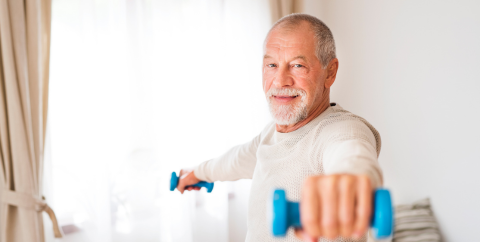Staying active during, after treatment can improve physical and emotional health
05 May, 2022
We know that exercise is good for the body to prevent a whole host of health conditions. The American Cancer Society notes that it’s also helpful for people with cancer, both during and after treatment, both in improving physical health and emotional wellbeing.
They even suggest trying to get started (or maintaining activity) before treatment to get your body ready for what it’s about to endure.
“Many people find that as they start treatment, the ability to be active may be harder. So, starting out in better physical shape means you can tolerate more activity during and after treatment,” ACS experts said.
During treatment, muscle loss can happen more quickly because of the effects of chemotherapy and radiation. Strength and stamina can also decline.
ACS guidelines suggest walking or doing some other moderate activity at least 150 minutes each week, preferably spread across several days of the week and for at least 10 minutes each session. Resistance training and stretching should also be done two days per week each.
Cancer survivor Michelle Stravitz, who was diagnosed with triple-negative breast cancer in June 2015, read about these guidelines and tried to stay active. She said what she found to be most helpful was having someone to exercise with.
She founded 2Unstoppable with a fellow survivor to help cancer survivors like themselves find community in fitness. We’ve added her organization to our ThriveNV Community Resources map (look under Fitness & Rehabilitation).
You May Also Like

Join a Virtual Research Study to Support Cancer Survivors' Physical Activity
02.19.2025
Are you a cancer survivor looking to stay active and healthy?

Feeling like a ghost? You’re not alone.
01.09.2025
Have you heard of “cancer ghosting”?

You Can Make a Difference in Cancer Support
12.04.2024
Together with the Cancer Support Community, we are on a mission to improve cancer support for patients, caregivers, and survivors.